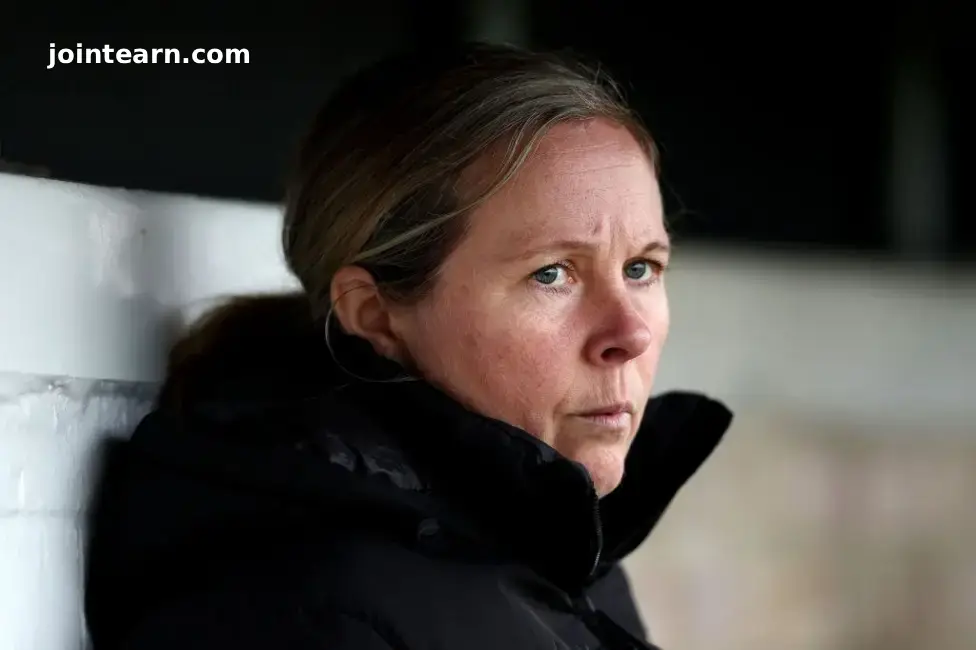
West Ham United manager Rehanne Skinner has opened up about the mental health pressures facing Women’s Super League (WSL) managers, warning that the lack of consistent support structures has created a “huge concern” within the women’s game.
In an emotional and candid interview with BBC Sport and the Girls on the Ball podcast, the 45-year-old former England and Wales assistant coach discussed the loneliness, instability, and relentless scrutiny that define life as a modern football manager — particularly in women’s football, where resources remain limited.
‘It’s a Lonely Place to Be’ — The Pressure Behind the Touchline
Skinner, who has managed at Leicester City, Arsenal, Tottenham Hotspur, and now West Ham, described the personal toll of the job. Managers, she said, are expected to balance on-field performance, player welfare, recruitment, and administrative duties — often with minimal support.
“There have been highs and lows in my career,” Skinner said. “The demands on managers are at the highest they’ve ever been, but the resources, support, and expectations often don’t match.”
After being sacked by Tottenham in 2023, Skinner admitted she questioned her methods and struggled with the emotional aftermath.
“When that happens, it knocks your confidence. You worry about the financial implications, your family, and even whether you can trust the system again.”
She revealed that the lack of stability — short contracts, modest pay, and the need to relocate frequently — adds enormous stress. Many WSL coaches earn around £70,000 annually, far below men’s football, where figures like Thomas Tuchel earn around £5m per year.
Living Apart and Burning Out
During her three-year spell at Tottenham Hotspur, Skinner lived away from her partner and described feeling “burned out” by the time of her dismissal. Unlike Premier League managers who have large backroom teams and longer contracts, WSL coaches often handle multiple roles — from player recruitment to welfare management — without adequate staffing.
“It’s a massive commitment people don’t talk about,” she said. “You’re on your own a lot, and it’s a lonely place to be.”
Even former managers such as Casey Stoney have experienced instability — Stoney was dismissed from San Diego Wave while attending a funeral in England, losing her visa and home access in the process.
‘Mental Health Support Feels Reactionary’
Skinner criticised the existing mental health infrastructure within women’s football, calling it “reactionary” and “underfunded.”
“If you raise concerns within a club, it can feel risky,” she said. “You worry it’ll be seen as a weakness and used against you. There’s pressure to turn up and perform regardless of what’s going on in your life.”
The only independent body currently offering confidential support to managers is the League Managers’ Association (LMA). Skinner said the organisation plays a crucial role but lacks sufficient funding to reach all managers.
Other resources, such as Sporting Chance and player care officers, primarily serve players rather than coaching staff. Meanwhile, the FA’s 2023 Karen Carney Review of women’s football performance systems failed to address managerial mental wellbeing.
“It feels like mental health is being paid lip service,” Skinner added. “The game has grown so fast, but we haven’t caught up with the human side of that growth.”
Dogs, Nature, and Finding Calm
For Skinner, mental wellbeing often begins with simple grounding rituals. She finds peace walking her three dogs — Alfie, a 14-year-old cocker spaniel; Luna, an eight-year-old sproodle; and Poppy, a playful two-year-old sproodle — at Weald Country Park in Essex.
“They force me to get outside, breathe, and switch off. It’s the one time I’m not thinking about football,” she shared.
‘We Need Mentors and Consistent Investment’
Looking ahead, Skinner wants to see systemic change — including the creation of independent mentors to support WSL managers on a regular basis, not just during crises.
“We need structured mental health education and trained support, not one-off courses,” she said. “The FA, the league, and clubs all have a responsibility. This is about performance as much as welfare.”
She believes consistent wellbeing programs would not only protect managers but also enhance on-field performance, mirroring the professional standards already embedded in the men’s game.
“If we make mental health support a normal part of the job, people will feel safer being open. It has to become part of performance culture — not an afterthought.”
A Call to Protect the People Behind the Game
As the Women’s Super League continues to grow in visibility and commercial power, Skinner’s message is clear: the wellbeing of the people driving that progress must not be ignored.
“Every club needs proper structures behind the manager,” she concluded. “No one should have to do five jobs at once. Health and wellbeing aren’t luxuries — they’re essential to performance.”
Skinner’s words echo a broader truth — that as women’s football breaks new ground, its leaders must ensure that compassion and care keep pace with ambition.


Leave a Reply